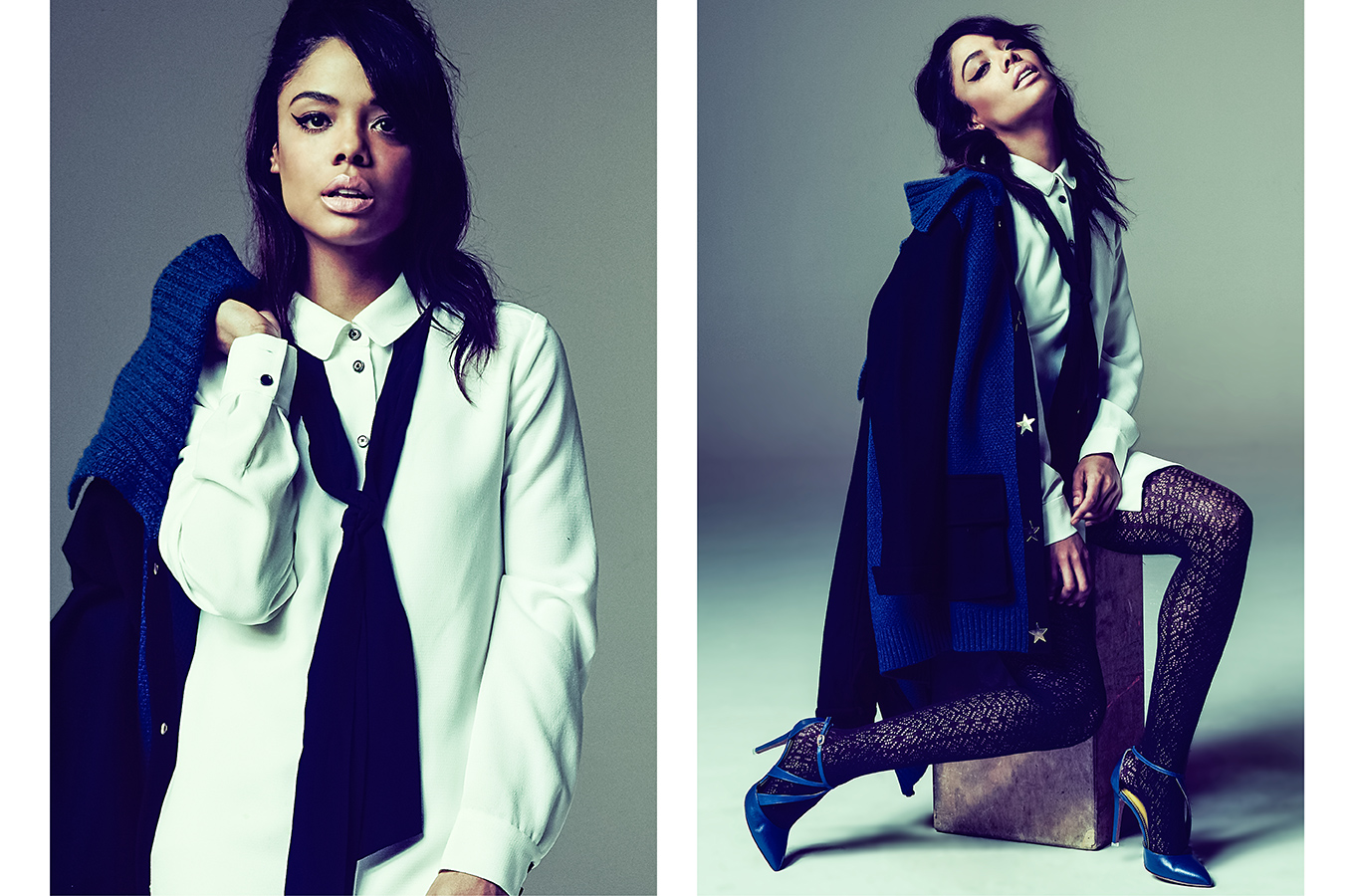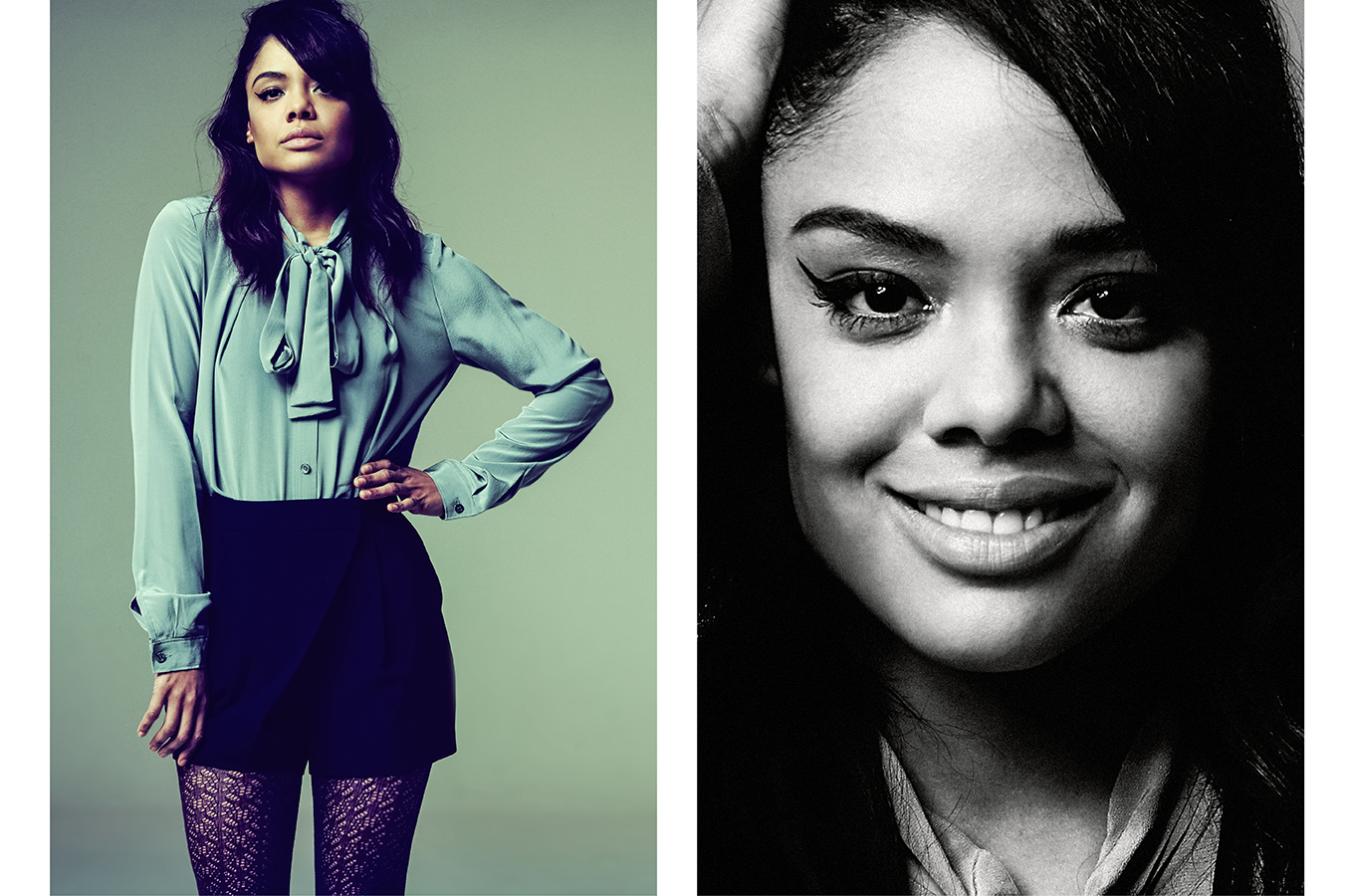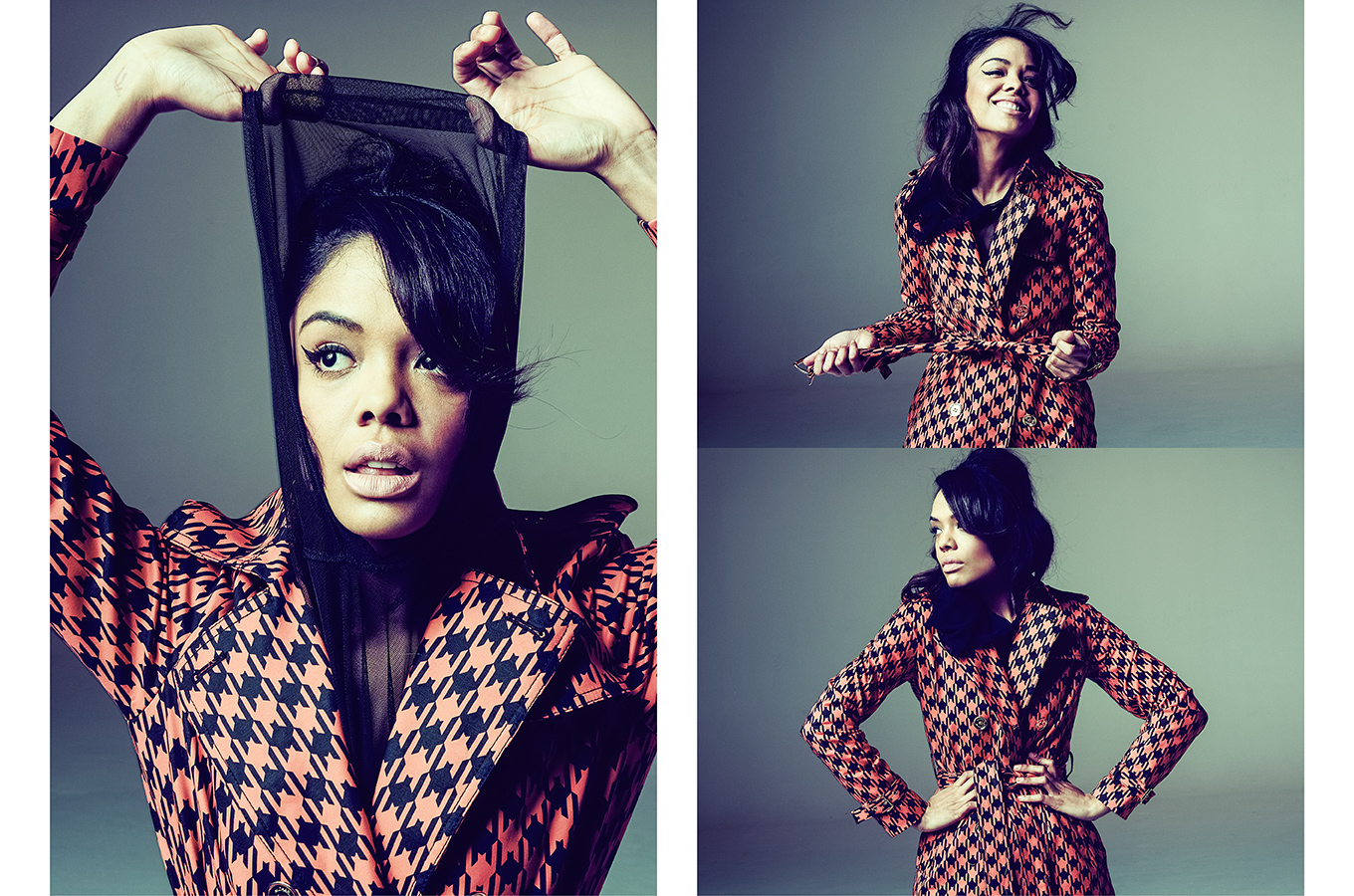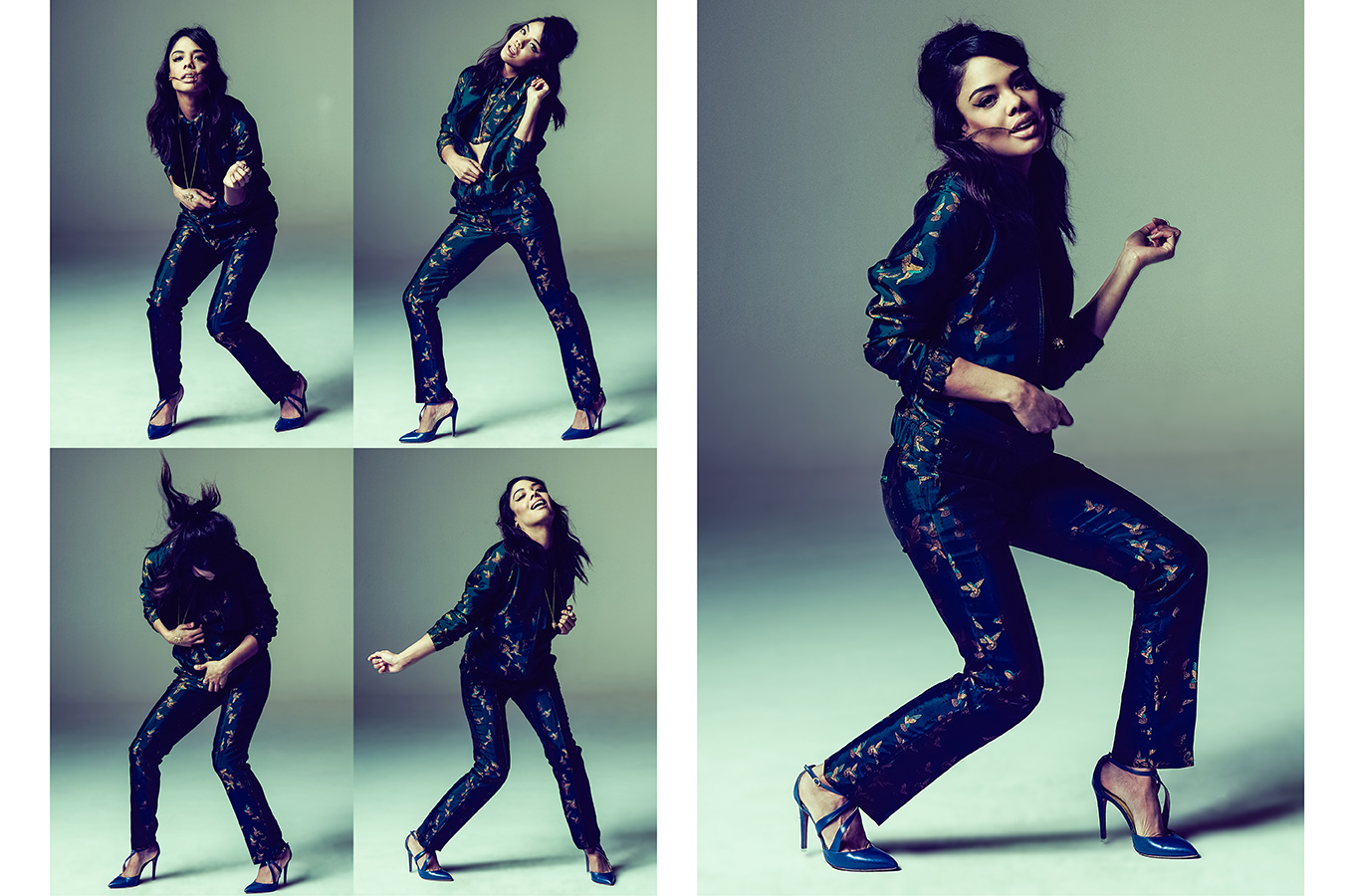Tessa Thompson
Images by Jan-Willem Dikkers
Styling by Jordan Grossman
Makeup by Dina Gregg
Hair by Sylvia Wheeler
Studio: Evidience Film Studios
Lights: Quixote
Interview by Holly Grigg-Spall
“It would serve us all, I think, if we could get behind people
for two hours that do not look like us and go on their journey.
I think that would be useful for society.
—Tessa ThompsonI think it would expand our humanity.” — Tessa Thompson
Tessa Thompson
Born and raised in LA, Tessa Thompson is an actress and musician who started in professional theater before moving to the screen. In 2014, she played the lead of Sam White in Dear White People and activist Diane Nash in Oscar-nominated Selma. Known also for her role on TV series Veronica Mars, Tessa will star in the upcoming Creed and recently released her debut album with Caught A Ghost.
Ryan Coogler
Born in Oakland, California, Coogler is a writer and director whose 2013 debut Fruitvale Station won the Grand Jury Prize and Audience Award at Sundance. That year, he was named on Time’s list of 30 people under 30 who are changing the world. His upcoming film Creed is a spinoff of the Rocky series, starring Tessa Thompson and Michael B. Jordan.
Selma
Directed by Ava DuVernay, Selma is a 2014 drama about Martin Luther King and his non-violent campaign during the 1965 voting marches from Selma to Montgomery, starring David Oyelowo as Dr. King. The film met with critical success, and is nominated for Best Picture at this year’s Academy Awards.
Dear White People
A 2014 independent satirical drama, written and directed by Justin Simien. Set at a predominantly white college, the film confronts race, following a group of black students with outspoken activist, Sam White (Tessa Thompson), at the helm.
Michael B. Jordan
American actor known for his lead role in 2013’s critically acclaimed Fruitvale Station and his recurring role in TV show Friday Night Lights. He is slated for the role of Apollo Creed’s grandson in the upcoming Ryan Coogler film Creed.
Caught A Ghost
Modern soul music project of songwriter and producer Jesse Nolan, drummer Stephen Edelstein and vocalist Tessa Thompson, whose debut album Human Nature is out now.
The Los Angeles born and bred Tessa Thompson just landed a major role in writer-director Ryan Coogler’s addition to the Rocky franchise, Creed. This headline-making move, combined with the recent release of the critically acclaimed and multi-award nominated Selma (in which Tessa portrays student Civil Rights revolutionary Diane Nash), sets her up for another stellar year. In 2014, Tessa created an icon in compelling campus activist Sam White for Dear White People, spurring the film’s international success and cult status. Issue caught up with her on the eve of the first day’s shooting for Creed to chat hashtag politics, Chris Rock, and making the “unconventional” choice.

Holly Grigg-Spall: So, right now you’re in Philadelphia shooting Creed, the Rocky sequel written and directed by Ryan Coogler. How is that going?
Tessa Thompson: We begin filming on Monday, but I’ve been here a couple of weeks wandering around Philly and preparing.
HGS: How did you come to find that role or how did they come to find you?
TT: I was speaking with Ryan Coogler and his co-writer Aaron Covington last night about this, actually. We were talking about how they’d gone to see Dear White People at Sundance last year and Aaron said something to Ryan about me back then. At that time, they were just starting to write Creed. Aaron followed me through the year. I auditioned, of course, but at the time there were a number of actresses they were interested in and also musicians. For a while, Ryan was keen on the idea of getting a musician without acting experience to play this part. I did the readings with Ryan and my co-star Michael B. Jordan, and after my audition I sent him a tape I had made of myself singing.
HGS: That’s right, because you are in fact a singer and you perform with Caught A Ghost.
TT: Yes, but until kind of recently I didn’t write any music. I co-wrote a song for the Dear White People soundtrack, and that was the first song I’d worked on. Ryan was looking for a female musician who wrote and produced her own work. I’d always been interested in songwriting—it was something I’d done in secret and had a few unfinished songs lying around. For the movie, though, I’ve had to write songs that will play in the movie, to a deadline. It’s been a big challenge for me.
HGS: Is there any cross-over between performing live with your band on stage and performing as an actor in movies and TV?
TT: I’ve always liked to sing. My father is a musician. A lot of my friends are musicians. But I was always more comfortable with the communal experience of singing. I used to sing in the LA Ladies Choir. I really enjoyed that process of singing with other women. The idea of singing on my own, with just my voice into a microphone, was daunting. I started performing alone reluctantly. I was worried too, as I think there’s a funny way of thinking about actors who want to make music. People tend to be more critical of that than if it’s the other way around.
The process of performing on stage with the band these past two years has been great because there’s a certain amount of bravado required. The experience with the audience is more intimate and direct in comparison to making a movie. It’s even different to theatre, I’d say. There’s usually a fourth wall. Plus the experience of being with an audience in a music venue, one that might have been drinking, one that’s packing punches you have to dodge and dance with, is very different. With Creed, because of performing on stage, I am now more apt to feel I can pull off this character—I now know more about that experience.
“When I started acting
it was in theatre and then television—
film was an afterthought in some ways.”
— Tessa Thompson
Nicole Disson
Los Angeles-based actress and producer known for the Sleepover LA, Fruits de Mer, and Revenge of the Bimbot Zombie Killers.
HGS: I interviewed a friend of yours, Nicole Disson, a few months ago and she mentioned that you met in the LA Ladies Choir. As you know, she’s very involved in the theatre, experimental and performing arts scenes in LA, and we talked some about how outsiders don’t see LA as a cultural city. What areas of the arts and culture, other than music and movie making, do you enjoy in LA?
TT: I’m an odd breed in that I’m a Los Angeles native. I’m very much an LA girl. I went to Santa Monica High School and, as a teenager, lived in Hollywood. I’m as LA as they come. I now work in Hollywood the industry, but to me Hollywood has always meant that kind of armpit of LA rather than the hills of Hollywood, the sign and that star-lined stretch of Hollywood Blvd.
I started acting in theatre. Los Angeles professional theatre is a community that doesn’t get its due from outsiders. I worked in theatre and then television – film was an afterthought in some ways. I never grew up watching movies thinking I wanted to be in them, but I always grew up doing theatre and I wanted to be on Broadway. So I still get involved in LA theatre and celebrate it and go to shows.
It was through the LA Ladies Choir that I met Nicole as well as lots of photographers, stylists, musicians, models, artists, directors—it was the beginning of my immersion in the LA arts scene and the experimental scene. It got me into the Silver Lake and Echo Park arts community. I’ve always been interested in subculture and in LA it’s harder to find, but I have managed to have love affairs with different subcultures like the late night DJ world that some of my friends are in and the bike scene, which is really vibrant in Los Angeles. In a city where everyone drives, there’s a great community of people who bike. I feel closer to those communities, in a way, than I do to Hollywood. It’s only because of my last few projects that I’ve become more integrated into Hollywood.
In fact, I have so many friends in the LA arts community who, until recently, didn’t even realize I was an actor. I would see these people out at nights like No American (which Nicole hosted at El Cid), where they wouldn’t play any American music. I studied cultural anthropology in college, so I’ve always been interested in music from different cultures. That was my scene, and for some reason it never came up that I was actually acting. Over the last year, these people have seen me in Selma and Dear White People, and they were shocked that I’m in Hollywood too.
HGS: Your role in Dear White People got you a lot of attention. I read in an interview that you saw the film as an “indictment of Hollywood”—were you nervous about how such a political, outspoken film would be received?
TT: I didn’t care at that time as I was, frankly, a little annoyed with Hollywood. I don’t want to bite the hand that feeds me, but I was in a really intelligent drama for two years (BBC America’s Copper), telling a story that was about this free black couple living in New York City in the Civil War period. That show got cancelled. I was hopeful about what was coming next, and I wanted to do something really interesting. But I was sent two scripts for two network shows in which my role would be a slave. They were compelling dramas in a way and valuable stories, but it wasn’t interesting to me. They were race-specific in a way I found boring. I didn’t want to work until something really exciting came along. Dear White People felt like a beacon of hope. It was a female character that was the subject of the narrative and not the object of the narrative. I was more nervous about the nature of the satire in the movie. The characters are mouthpieces more than they are real people. I felt worried about taking that language, which bordered on the Aaron Sorkin-esque heightened style, and making it something you could really get behind. I was also nervous about making my character real rather than just a caricature.
HGS: Chris Rock recently wrote an essay on being black in Hollywood for The Hollywood Reporter. He wrote how back when they were making the Starsky and Hutch movie he was offered the role of Huggy Bear, but in his mind, watching the TV show as a kid, he had always been Starsky or Hutch. He didn’t want to play Huggy Bear. Yet the execs felt compelled to honor this TV show as though it were a historic drama and cast white men in those roles. Can you relate to that experience at all?
TT: It’s certainly a chip that I have on my own shoulder when I go after roles. There are certain roles that are just not written for someone like me. I realize the kind of conversations that need to be had there if they were going to choose to go with me. They feel they are taking a risk or making a choice that is “unconventional.” It’s something I’m aware of, but I do see it as shifting. I acknowledge it happens, but if I acknowledge it too much then I feel I get too conscientious of it, and I’m not fighting. I’m not optimistic enough to see opportunities where they might exist.
Sometimes I look at social media to see how things might be changing. I look at the hashtag #DearWhitePeople and every so often someone will post something like, “I want to be Sam White,” and it will be an Asian woman or a white guy. I get really excited in those moments.
Like Chris Rock, I’m really accustomed to watching films and looking at a character who looks nothing like me and feeling that I am that person. Unfortunately, that doesn’t work the other way around so much. Unless we get into movies starring like Will Smith or Denzel Washington, then a film with a black lead is a “black movie” for black people. There’s that separation.
It would serve us all, I think, if we could get behind people for two hours that do not look like us and go on their journey. I think that would be useful for society. I think it would expand our humanity.
“Dear White People felt like a beacon of hope.
It was a female character
that was the subject of the narrative
and not the object of the narrative. ”
— Tessa Thompson
HGS: I used to work at a TV production company and I would hear execs say black people only want to watch black people in shows and white people only want to see white people. I wondered whether the tail was wagging the dog there…
TT: I don’t know how to make sense of that, but I do feel like the needle is edging forward. Dear White People sold really well internationally. The Hollywood Reporter had this headline saying it was tearing away at the myth that black faces don’t sell abroad. It sold in Scandinavia and it sold in Hong Kong. It sold almost as much as or as much as 12 Years A Slave, which of course won Oscars.
HGS: To return to what you were saying about Twitter and hashtag activism, Selma portrays a time when the only way to make a difference was to organize a protest or march and take to the streets with other people. We seem to be returning to that strategy these days. What are your thoughts on social media activism versus that kind of demonstration? Particularly considering how people chose to protest the so-called Oscars “snub” of Selma director Ava DuVernay with #OscarsSoWhite.
TT: I was just this week at the University of Florida speaking to students on the legacy of Dr. Martin Luther King. My talk was about just this—social media and activism. On MLK Day, I was on Instagram taking a break from writing my speech and there were all these pictures of Dr. King. I put in the hashtag and saw all the photos strangers had posted of him, then I found myself looking at those strangers. I realized he was kind of connecting me to other people in this weird way that’s totally disjointed. I wasn’t out on the street, I was looking at all these other people online who were, in turn, looking at other people too.
Although I do think direct action and organizing and having conversations like I had at UF is more valuable, I do think there’s something valuable about the internet being used to orchestrate that and organize those conversations. With the supposed Oscar snub, people organized their feelings around that hashtag and I think that was useful. People might have these feelings alone and they’re in this bubble. The internet can divide us, but it can also bring people together around something.
The question I was asking students at UF is how do we get better at using the resources we have available to us. When I was researching for Selma, I was amazed at how they organized before having all this technology. I couldn’t wrap my brain around how exquisitely those demonstrations and sit-ins were planned without the use of the internet.
HGS: What were some of the stand-out questions asked of you by the students at UF?
TT: One guy asked about the responsibility of celebrity. Another mentioned that he thought none of the cast and crew of Selma had taken to the streets to protest, which is actually totally untrue, most all of us have. The times we couldn’t it was because we were promoting the movie. I think we all have a responsibility, however our expectation and flagellation of celebrity today is so crazy. I also reminded them that some of the leaders shown in Selma were national celebrities because of the work they were doing.
One guy asked, with a lot of frustration and pain actually, about the double standard in black and white beauty and pop culture. He asked, “Why is it that if a black girl dyes her hair blue, both black and white people think it’s not classy, but if a white girl does the same, it’s seen as artistic and interesting?” He said, “Why do they (society, I think) do it to us and why do we do it to ourselves?” I thought that was interesting.
HGS: Is there anyone in the entertainment world that you think does political activism very well and manages the responsibility of celebrity in that way?
TT: I really loved the speech Emma Watson gave at the UN—her “He for She” speech. Usually you get to see celebrities speak only at press events, and then you can’t tell how someone actually feels about the movie. I loved what she had to say about feminism. I really related to what she said about being called bossy as a little girl. I was a “bossy” kid too, and I called myself bossy and didn’t think about the implications. I enjoyed her speech also because I felt I heard something in her voice that I had not heard before, either in her movies or her interviews. It was a mixture of vulnerability from being outside of her comfort zone and speaking in a place she was probably so honored and nervous to speak at, but then also this passion that was something new and different. She did such a tremendous job and there was something so honest about it.
“I don’t want to be boxed in
because my last two projects explored race
and politics. In a way, though, because of
who I am and what I look like, if I do get cast
that just becomes political. ”
— Tessa Thompson
The Prop is the Girl
Upcoming film from writer and director Stephen Coombs, The Prop is the Girl is based on the true story of a 20-year-old trying to overcome her PTSD after sexual assault.
HGS: One movie you have coming up sounds like, at least from the title, it might have a strong political purpose, The Prop is the Girl.
TT: That is a film made by a dear friend of mine. They shot it over a couple of years. It’s kind of fly-on-the-wall, exploring rape culture in the South Bay in California. I don’t play the lead, I play her friend, but the main character goes to a clinic for a kind of medical survey and she has to confront how she had been drugged and raped. She has to deal with that and heal from that. The project has been working in partnership with a couple of organizations that help victims of rape and also help men understand that psychology.
It was really guerrilla filmmaking, which I enjoy. It’s one of those projects where those involved were not waiting for anyone’s permission. There are certain movies that no one wants to touch, especially those talking about rape culture. People don’t want to get behind those projects because they don’t see a market for it. The filmmakers did whatever they had to do to get the movie made. I love people who do that.
HGS: What are your hopes and plans for the future?
In A World
Written, directed by, co-produced by and starring Lake Bell, In A World is a comedy about a woman struggling to make it as a voice-over artist. It premiered at Sundance 2013.
Obvious Child
Written and directed by Gillian Robespierre, Obvious Child is a 2014 feature based on her 2009 short film. The film stars Jenny Slate as a stand up comedian who decides to have an abortion after a one night stand.
TT: I don’t want to do anything until I feel I gotta do it. I want to go for parts I will fight for and would be devastated not to get. I felt like that about Creed. I was such a fan of Ryan Coogler. He’s one of the most curious people I’ve ever met. He has a desire to find something that feels authentic. I had a hunch it would be something that would be really cool. I don’t feel any dogma about what kind of project I do next—I can see there being an action movie or superhero movie or a silly comedy I feel that way about.
I’m really inspired by people like Lake Bell and what she did with In A World, as well as the kind of collaboration that brought about the movie Obvious Child. I’d like to be more proactive in that way and find those kind of people to make things with.
I don’t want to be boxed in to any extent just because my last two projects explored race and politics. In a way, though, with some projects, because of who I am and what I look like, if I do get cast that just becomes political, in the same way the internet exploded with the idea of a black Stormtrooper. It happens around you.










